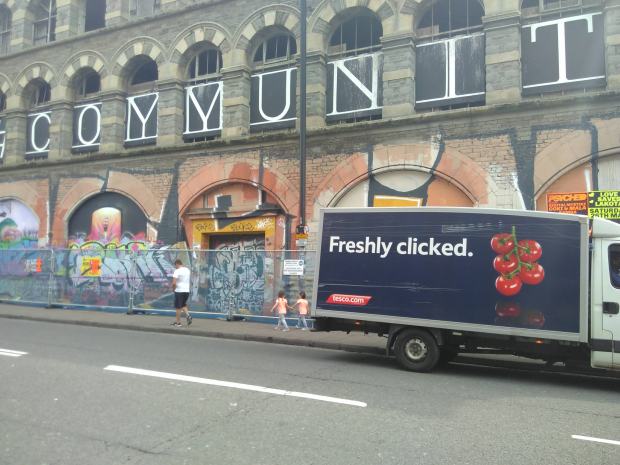
The supermarket delivery van that appears as if by magic is driven by a worker. The picture of table grapes, succulently drawing us into the marketing of this retailer, were almost certainly picked by a person, not a machine. Yet machines and artificial intelligence are involved too. Understanding the ways in which humans and machines are placed in relation to one another in the workplace is a complex challenge. Addressing it are social scientists who consider human interactions, critical management scholars who try to understand the organisation of work and finance, and legal specialists who are attempting to establish frameworks for the governance of the present and future of work.
A new working paper published by the University of Bristol’s Faculty Research Group for Perspectives on Work brings scholars from these fields together to ask: what is the future of work? Is it something characteristically different from the past and present? Or is it ultimately just a continuation of workplace dynamics today? Just capitalist relations of production and profit in different dress? In the paper, my colleagues and I do not dispute that shifts are occurring in the organisation and lived experience of work. However, we argue that these shifts are contingent on the present relations between capital, workers, technology and the social and ecological contexts within which work takes place. The future of work is therefore one that we know very well, even if the wolf has changed its clothes.
Our paper takes a broad view of how work has changed, and will change. Many significant changes in recent decades relate to the spatial reorganisation of work. Consider for example that 83 per cent of the world’s manufacturing workforce now live in the Global South. This indicates a tremendous shift in the places and types of jobs available in different regions of the world. Alongside this has occurred perhaps an even greater shift in the world’s working relations as services have become the largest global sector for employment accounting for 51% of workers, overtaking agriculture which now employs just 26.4% of the global population. As recently as the 1990s it was agriculture that was the major employer with services very much behind.
These changes have been accompanied by an overall trend towards urbanisation as, at the turn of the millennium and for the first time ever, more people lived globally in urban rather than rural environments. This broad perspective allows us to consider the changes in work. To begin with, as evidenced by the ever-increasing volumes of global trade, work now increasingly occurs in the context of political and economic relationships that are global in scope.
We are reminded by Noah Zatz and Eileen Boris, that when thinking about ‘work’ what is “at issue is not only what is being done, but also by whom, for whom, and why”. Therefore, as important as thinking about what jobs are around, is to think about who does such jobs for whom. Here, we consider mobility again, but this time not the movements of things through trade, but the mobility of people. Labour markets are fragmented and segregated and who does what often relates to individual and collective histories and status, leading the work of some to be recognised with honorific titles and the work of others to go unrecognised or undervalued.
These abstract questions can be very difficult to engage with and so in the paper we take on two case studies, that of care work and agri-food work. These case studies are ones which are closely associated with the future of work as they involve jobs which are poorly remunerated and can be arduous, as well as often of low-status. Many fall into the category of the so-called ‘3D’ jobs: Dirty, Dangerous and Demeaning. These are also jobs associated with labour migration as high numbers of migrant workers often occupy these roles.
The interesting thing about both care and agri-food work is that there are clear reasons in both cases why the people in these jobs are unlikely to be replaced by ‘robots’ in the short term. In the case of care work, the needs of those being cared for are complex, changeable and require emotional responses from carers – paid or unpaid. Furthermore, care is tied to the places in which those who need to be cared for are based. As captured in the concept of Global Care Chains some of these roles are highly dependent on migrant workers leaving others to care for their own families. These ‘others’ are both workers and family members. So even if there is persistent inequality in the way care jobs are organised, it seems likely that migrant workers and non-migrant workers are likely to continue working side by side in these roles, even if some robotisation also occurs. Whilst it is likely that more tasks may be mechanised, perhaps leading to fewer workers, the fact that people need to be involved at some stage is relatively non-negotiable.
In the case of farm work we recognise that the long history of farming, as in other sectors, has involved the successive replacement of workers for increased mechanisation. However, there are still many tasks in modern food systems that require people. Ironically, like the grapes in the photo above, it is precisely many of the emblematic fruit and vegetables advertised in supermarket adverts as immediately available and fresh, that require careful hand picking. While it is possible to mechanically pick crops such as tomatoes and grapes, this renders the crops good only for processing, such as canning and ketchup for tomatoes. Those delicious looking ‘fresh’ products that draw us into the stores and websites still require hand picking.
A further point to make is that by overemphasising the degree to which ‘everything is done’ by a machine, it can be difficult for workers to gain visibility, good remuneration, as well as respect and status in the labour market. Workers in these sectors are not doing unskilled tasks easily replaceable by machines; they are doing jobs that require skill, dexterity, fast responses to changing conditions as well as complex strategies for negotiating difficult labour markets with often undesirable working hours.
There is a need to re-valorise work and workers, to recognise not just where robots are replacing jobs – their replacement by technology – but also where people in jobs are working under increased pressure or insecurity due to their increased relationship with technology. We understand the common use of the word robots here to really refer to a range of automated systems from computers such as the automated check-out tills to platforms such as Deliveroo. Both of these examples require many people for them to function.
What we mean by ‘work’ – when someone works and does not – is increasingly important in order to value not just the worth of an individual who may not have their work recognised as a traditional ‘full time job’ but also to inform our legal systems and social systems which struggle to keep up with the evolving reality of the present as well as the future of work.

This piece is based on the Perspectives on Work Faculty Research Group Working Paper #1: The ‘future’ of work? A call for the recognition of continuities in challenges for conceptualising work and its regulation.
The choice of table grapes was inspired by the visiting PhD student Miguel Angel Sanchez who has been based at the University of Bristol as a visiting student from the University of Murcia, Spain, and who is researching quality standards in table grape production.
This post was originally published in the Futures of Work on-line magazine, Issue 4.






